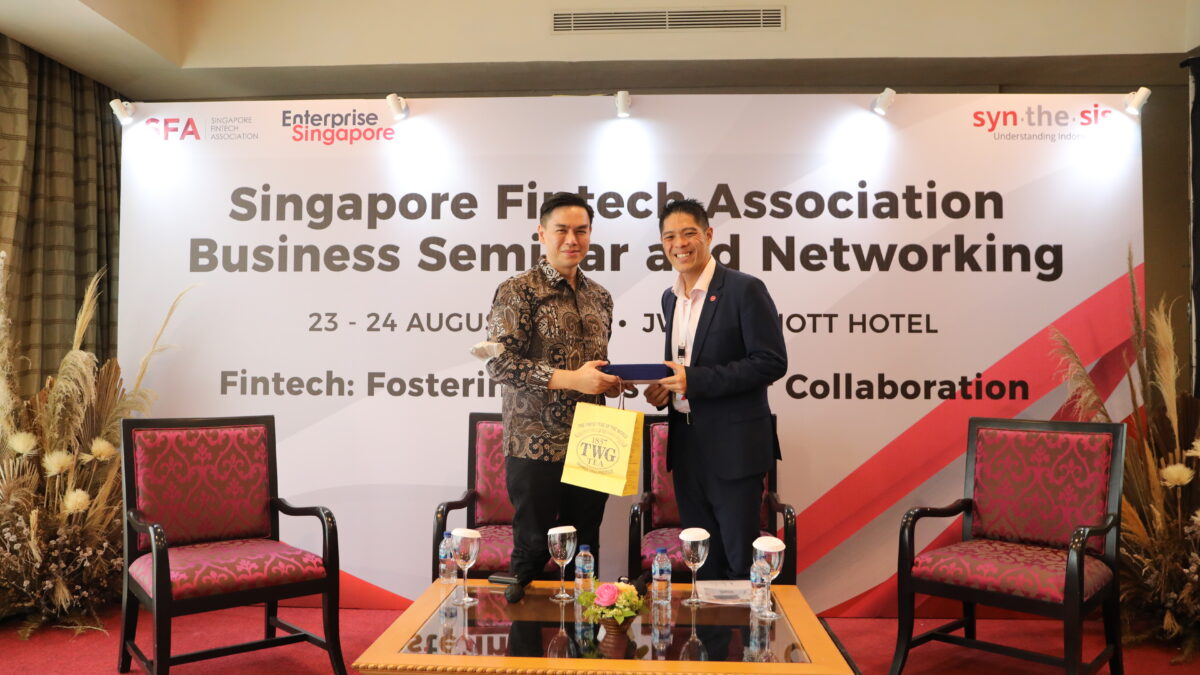AFTECH: Indonesia’s Fintech Market Offers A Multi Trillion Rupiah Business Opportunity
JAKARTA, August 24, 2022 – The growth of the digital economy in Indonesia promises great investment opportunities not only for local investors but also for foreign investors. Moreover, recently, the government has continued to update regulations to encourage greater investment is the fintech space.
To further dissect investment opportunities in Indonesia’s digital economy, the Singapore Fintech Association and Enterprise Singapore together with Synthesis Communication Indonesia held a business seminar and networking entitled “Fintech: Fostering Cross Border Collaboration”. The event was attended by 18 SFA members and numerous Indonesian Companies from various sub-sectors of the digital economy.
The event was also attended by representatives from the various fintech companies member of Indonesia Fintech Association or AFTECH.
In his remarks, Bambang Suwarso from the Indonesian Chamber of Commerce Indonesia highlighted certain dos and donts for foreign firms doing business in Indonesia.
“Relations among employees really matter. We need to notice that sometimes when we don’t involve or have good discussion with them, they may be hijacked by the competitor,” Suwarso said.
Alwin Jaberti, CEO of Indonesia digital signature and ID company TekenAja (VeriJelas) and the Deputy Secretary General of AFTECH noted the country’s Fintech sector had matured over the past few years.
The Indonesia fintech landscape has been dominated by P2P lending, where lending disbursement reached Rp 44.3 trillion as of end June 2022, compared to IDR33.6 trillion in December 2021. P2P lending firms have successfully tapped the unserved market by traditional financial institutions, especially on Java. As P2P lending has been primarily focused on Java, there is huge growth potential in the other islands.
“Before 2018, the landscape of Indonesia’s fintech sector very simple with only two main activities of digital lending either through P2P lending or through payment systems. But after 2018 it is expanding from digital payment and digital lending to digital capital, insurtech, wealth tech and market provisioning,” said Alwin.
The association also pushed more initiatives to boost financial inclusion, including working with regional or provincial banks for working capital lending disbursement. Currently only around 7% of total regional banks loans are being disbursed properly. Having said that, there are still around 92% idle money in provincial banks that can be channelled into productive credit by collaborating with crowdfunding fintech.
Alwin Jaberti CEO of VeriJelas, Dima Djani CEO of ALAMI and Melisa Irene, Partner East Ventures discussed possible collaboration between Indonesian and Singapore fintech firms.
Chief Operating Officer of the Singapore Fintech Association, Reuben Lim, said the association members who attended this event were very enthusiastic about getting to know the Indonesian’s latest landscape of its fintech industry as well as areas of collaboration where they can tap in. They come from various subsectors ranging from tech players in ESG, payments, security crowd funding, and digital assets provider.
“Indonesia, just like Singapore, I think is experiencing exponential growth not only within B2C segment but also B2C segment as echoed by the speakers today. We see that there is a very strong collaboration opportunity between the Fintech players from both countries,” said Lim.
Answering question on the most sexiest categories within fintech, Alwin said the securities crowd funding category is very interesting right now. It is basically securitized projects by SMESs which retail investors could participate in based on certain criteria. However, there needs to be greater education and better structure of the projects.
Another category that is gaining acceptance is credit scoring. “So I think the use of more and more big data and alternative data will grow in Indonesia,” Alwin added.
Digital banking also offers tremendous opportunities for fintech players. “Even more and more traditional bank like regional bank partners aggressively with fintech as they don’t need to invest in capital expenditure. In reverse, fintech benefited from the strength of traditional bank in knowing the culture population, the local wisdom,” said Alwin.
In terms of selecting the right partner, Melisa Irene, partner for East Ventures said that that many organizations can help to bridge the gap between the two parties.. “Before entering a transaction, it is important for the investor to understand the other party so they can have a conversation. Also, we need to reach out to people that can introduce us, like some one’s point of view of us.”
She added that the B2B market in particular offers great potential given that Indonesia’s large SMEs sector and the greater availability of data.
On the same question, Dima Djani, CEO of ALAMI said in business partnerships, chemistry is a top priority. “We need someone that can understand different cultures and who are already accustomed to Indonesian culture. Also in terms of technology, Singapore tends to have a deeper understanding.”
“We need a communications team that can breach the gap with potential partners or when we are approaching the market. For example when we enter Bandung and the Jakarta market, companies from these two cities will have vastly different expectations in terms of pace and execution strategy,” he added.

